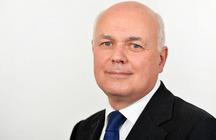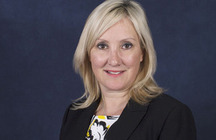Iain Duncan Smith – 2002 Speech to the Jewish Welfare Board
Below is the text of the speech made by Iain Duncan Smith, the then Leader of the Conservative Party, on 26 April 2002.
As Leader of the Conservative Party, I have had the privilege of meeting with and addressing a number of Jewish organisations.
Almost every time I have done so, it has been against a backdrop of great sadness.
I have spoken to Jewish audiences just days after yet another suicide terrorist attack on Israel, just days after anti-Semitic incidents across Europe and just days after an article in the press written by a Jewish author urging more understanding of Israel’s plight.
Unfortunately, as I stand here today, the backdrop is no different.
But this time, there is an added factor. In my conversations with British Jews, I get a sense that there is deep anxiety and unease amongst the British Jewish community about the fate of Israel and public opinion.
Israel
Last week on Radio 4, Chief Rabbi Jonathan Sacks spoke passionately and eloquently about this unease. He reminded listeners that Israel had suffered 12,500 terrorist attacks – almost one hour of every day of every week.
He urged that the media to be more balanced in its criticism of Israel.
I agree. When watching our TV news bulletins I am often struck by the lack of sense of proportion and tendency to succumb to moral relativism.
Of course the crisis in Israel and the West Bank is a tragedy: a tragedy for Palestinians and Israelis. When innocents die wherever they come from we must all grieve.
Yet to insinuate that this is the fault of Israel is to wilfully misrepresent the facts. After all, the peace process – when Mr Barak’s proposals at both Camp David and Taba were turned down by Yassar Arafat.
Criticism should therefore be.
We will disagree with Israel sometimes about tactics. We urge that Mr Sharon withdraws speedily from the West Bank Towns.
It is the duty of any Government to protect their citizens from terror.
Just as the United States and the free world were right to pursue Al Qaeda and the Taliban after the outrage of September 11, so the Israelis have a right to react against the terrorists who are trying to destroy her very existence.
All the peace plans currently on offer will not work unless the Palestinian leadership grasp the nettle and no longer give succour to terrorists.
Neither is the cause of peace helped by those who should know better seeking to fan the flames of hatred by encouraging suicide bombers.
It is no good Chairman Arafat on the one hand writing in the New York Times an article condemning terror and recognising Israel’s right to exist and on the other covertly giving impetus to terrorist organisations like Hamas.
There must be no doubt that if the Palestinians are really committed to peace, the Palestinian Authority can call off the terrorists – just as they did for 24 days last Christmas.
We support the Tenet peace plan and Mitchell proposals and welcome the dialogue begun by Prince Abdullah of Saudi Arabia. However, one vital key to the whole peace process must be the short and long term guarantee of Israel’s security, within secure and internationally recognised boundaries.
For its part, my party will work hard with the Government and President Bush to achieve these goals.
Moreover whilst we may differ with Israel over specific actions we must do all we can to support the values she stands for because these are the values that distinguish democracies from dictatorships and will underpin a real and lasting peace.
The British Jewish Community and Anti-Semitism
One of the alarming consequences of the problems facing Israel has been the resurgence of anti Semitism and the increased anxiety amongst Jewish communities in Europe.
Le Pen on the rampage in France, Jorg Haider in Austria and the rise of extremist parties elsewhere in Europe will heighten these forebodings.
I heard of marchers in Bournemouth shouting death to the Jews.
I am increasingly concerned when I hear reports of attacks on British Jews. 310 individuals alone last year.
But I am saddened when I hear members of the ‘chattering classes’ indulge in thinly veiled ‘salon anti-Semitism’.
The apparent remarks by poet Tom Paulin, that American Jewish settlers were ‘Nazis’ and should be shot are – if accurate – unforgivable.
When I think of these things, I am reminded of a recent meeting I had with a European Conference of Jewish community leaders. I told them of a powerful statement by Martin Luther King:
You declare my friend that you do not hate the Jews, you are merely anti-Zionist…when people criticise Zionism, they mean Jews. This is God’s own truth. Anti-Semitism, the hatred of the Jewish people has been and remains a blot on the soul of mankind. In this we are in full agreement. So know also this: anti-Zionism is inherently anti-Semitic and ever will be so”.
Of course this does not mean that we can never criticise Israel or question her activities. I have some misgivings about the long-term course which Mr Sharon is engaged in but I understand the need for defence against the suicide bombers. But I think that the Israeli people will be quick to distinguish between those who are her real, but candid friends and those who want to use attacks on Israeli actions as an excuse for justifying their prejudices.
The Jewish Contribution
I think it was Peter Ustinov who once said:
I believe that the Jews have made a contribution to the human condition out of all proportion to their numbers: I believe them to be an immense people. Not only have they supplied the world with two leaders of the stature of Jesus Christ or Karl Marx, but they have even indulged in the luxury of following neither one nor the other!”
Jewish communities embody principles of family, neighbourliness and responsibility towards those in need.
Nowhere has this been truer than in Britain, where you have offered beacons of hope to the vulnerable amongst your community.
I understand that you have a Hebrew statement for this; Tzedekah (the act of giving).
Today’s society faces a paradox perhaps never faced before.
We have more choice than ever but more insecurity.
We have more mobility, yet our communities and neighbourhoods are breaking down.
We have more generous welfare benefits yet so many are still impoverished.
We are spending billions on our public services yet not getting the services we require.
In short we have entered an age of deep insecurity and anxiety not just in the global village but the moment we open our front door to our own neighbourhoods.
Of one thing I am certain. If we are to ease that insecurity. If we are to fill the vacuum that exists at the heart of our neighbourhoods and communities, then we must make every effort to pin together what we have termed “the neighbourly society”.
This will not be achieved by state intervention alone.
To build a strong infrastructure in our neighbourhoods, and therefore help those most in need, we must have a thriving network of strong families, community groups, voluntary associations, faith inspired organisations and others – all dedicated to public service and responsibility to others.
It is only this network that can buttress the foundations of the neighbourly society.
I agree with the historian of the Leeds Jewish Welfare Board, Mr Heinz Skyte when he writes:
“the ethos of voluntarily contributing to the society, which nurtures us is deeply ingrained”.
This is the essence of Conservatism and what I mean when I say that my party will stop at nothing to help the most vulnerable people in our country – whether it be in the Easterhouse Estate in Glasgow, which I visited recently, London or in Leeds.
To achieve these things, we need not always start from scratch.
We need to look at organisations and individuals that are working hard to transform their communities. We need to visit them to learn best practice and see what more can be done to help them flourish.
We need to understand how it is that politicians so often create the problem of dependency which has blighted our society.
Since you were first established as the Jewish Board of Guardians in 1878, your whole purpose has been to provide relief to the poor, children, the old, the mentally ill and disabled, all through initiative, hard work and voluntary action.
What better demonstration is there of support for the family, community and those in need?
It seems to me that your commitment to family is deeply rooted at the heart of your organisation. I am told that Mr Robert Manning, your President who has done so much to make the Leeds Jewish Welfare Board the success that it has become, is the son of a previous President.
Moreover, I think I am right in saying that Mr Edward Ziff who has worked so hard to raise funds is part of a third generation dynasty of the Ziff family that has been on the Board since the 1940s.
There can’t be many better examples of the importance of family ties.
Your initiative has enabled you to raise £1.5 million on provision of vital services for the Jewish community in Leeds.
I am told that you have even found an ingenious use for the Euro in persuading people to part with approximately £2000 pounds in obsolete foreign currency.
That is one currency I hope helps you more, as it becomes more obsolete.
Through all your work, you have shown that the neighbourly society is something that really can be achieved.
That working within one’s community from the grassroots upwards to help the needy can have astonishing results – far better than any top-heavy, top-down, bureaucratised ‘anti-poverty’ scheme emanating from Whitehall.
When I look at this achievement, alongside the many others of the Jewish community; in education, in charity, in philanthropy and the professions I have no doubt that the Jewish sense of identity and tradition will continue be as vibrant as ever through our future generations.
When I think of the contribution made by the Chief Rabbi and other senior Jewish leaders to our national life and to civil society I am confident that this difficult period for the Jewish community will pass and that you will go from strength to strength.
That is why I believe it is incumbent on those of us in positions of influence to ensure that this is so. Britain’s proud status as an open and tolerant society depends upon it. It is the right and proper thing to fight for such tolerance and remind ourselves that friendship is for bad times as well as good.


